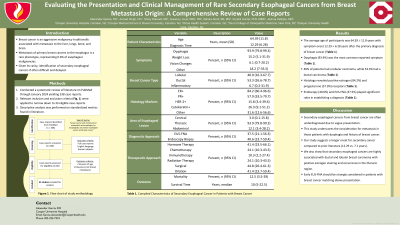Sunday Poster Session
Category: Esophagus
P0515 - Evaluating The Presentation and Clinical Management of Rare Secondary Esophageal Cancers From Breast Metastasis Origin: A Comprehensive Review of Case Reports
Sunday, October 27, 2024
3:30 PM - 7:00 PM ET
Location: Exhibit Hall E

Has Audio

Alexander Garcia, DO
Cooper University Hospital
Camden, NJ
Presenting Author(s)
Alexander Garcia, DO1, Avneet Singh, DO1, Shrey Dalwadi, BS2, Queenzy Jover, BSN, RN3, Zehara Abidi, BS, MS4, Krystal Hunter, PhD, MBA5, Joshua DeSipio, MD2
1Cooper University Hospital, Camden, NJ; 2Cooper Medical School of Rowan University, Camden, NJ; 3Virtua Health System, Camden, NJ; 4Touro College of Osteopathic Medicine, New York, NY; 5Cooper University Health Care, Camden, NJ
Introduction: Breast cancer is an aggressive malignancy traditionally associated with metastasis to the liver, lungs, bone, and brain. However, esophageal metastasis from primary breast cancers is a rare phenotype, representing 0.6 % of esophageal malignancies. This descriptive study consolidates the 33 recorded cases of secondary esophageal cancer from breast cancer metastasis to better develop a framework for clinical management.
Methods: We conducted a systematic review of literature on PubMed through January 2024 with the following grouped search terms: breast cancer, metastasis (or metastatic), and esophagus (or esophageal); secondary esophageal cancer and breast cancer. 338 results were obtained. Further selection was designated by restricting to only full case reports in the English language with human subjects. This yielded 60 studies. 27 cases were removed due to the inclusion of children (< 18 years of age) or irrelevance (not secondary breast metastasis).
Results: The average age of participants was 64.39 ± 11.8 years with symptom onset 12.29 ± 6.28 years after the primary diagnosis (breast cancer). Dysphagia was the most commonly reported symptom (93.9 %). 40 % of patients had a lobular carcinoma, while 53.3 % had a ductal carcinoma. Histology revealed positive estrogen (84.2 %) and progesterone (57.9 %) receptors, among others. The secondary lesion was consistently found in the thoracic esophagus (93.9 %). Endoscopy (40.6 %) and EUS-FNA (37.5 %) played significant roles in establishing a diagnosis. Treatment typically consisted of hormone therapy (41.4 %), surgery (44.8 %), and palliative dilation (41.4 %).
Discussion: Secondary esophageal cancers from breast cancer are often underdiagnosed due to vague presentation. This study underscores the consideration for metastasis in those patients with dysphagia and a history of breast cancer. While presentation (dysphagia) is in line with prior literature, our study suggests a longer onset for secondary cancer (12.29 vs. 7.1 years). We also show that secondary metastasis is highly associated with ductal and lobular breast carcinoma with positive estrogen staining and occurrence in the thoracic region. A recent study demonstrated the growing utility of EUS-FNA as a diagnostic modality for the diagnosis of breast metastasis in the esophagus. Early EUS-FNA should be strongly considered in patients with breast cancer matching the aforementioned characteristics.
Disclosures:
Alexander Garcia, DO1, Avneet Singh, DO1, Shrey Dalwadi, BS2, Queenzy Jover, BSN, RN3, Zehara Abidi, BS, MS4, Krystal Hunter, PhD, MBA5, Joshua DeSipio, MD2. P0515 - Evaluating The Presentation and Clinical Management of Rare Secondary Esophageal Cancers From Breast Metastasis Origin: A Comprehensive Review of Case Reports, ACG 2024 Annual Scientific Meeting Abstracts. Philadelphia, PA: American College of Gastroenterology.
1Cooper University Hospital, Camden, NJ; 2Cooper Medical School of Rowan University, Camden, NJ; 3Virtua Health System, Camden, NJ; 4Touro College of Osteopathic Medicine, New York, NY; 5Cooper University Health Care, Camden, NJ
Introduction: Breast cancer is an aggressive malignancy traditionally associated with metastasis to the liver, lungs, bone, and brain. However, esophageal metastasis from primary breast cancers is a rare phenotype, representing 0.6 % of esophageal malignancies. This descriptive study consolidates the 33 recorded cases of secondary esophageal cancer from breast cancer metastasis to better develop a framework for clinical management.
Methods: We conducted a systematic review of literature on PubMed through January 2024 with the following grouped search terms: breast cancer, metastasis (or metastatic), and esophagus (or esophageal); secondary esophageal cancer and breast cancer. 338 results were obtained. Further selection was designated by restricting to only full case reports in the English language with human subjects. This yielded 60 studies. 27 cases were removed due to the inclusion of children (< 18 years of age) or irrelevance (not secondary breast metastasis).
Results: The average age of participants was 64.39 ± 11.8 years with symptom onset 12.29 ± 6.28 years after the primary diagnosis (breast cancer). Dysphagia was the most commonly reported symptom (93.9 %). 40 % of patients had a lobular carcinoma, while 53.3 % had a ductal carcinoma. Histology revealed positive estrogen (84.2 %) and progesterone (57.9 %) receptors, among others. The secondary lesion was consistently found in the thoracic esophagus (93.9 %). Endoscopy (40.6 %) and EUS-FNA (37.5 %) played significant roles in establishing a diagnosis. Treatment typically consisted of hormone therapy (41.4 %), surgery (44.8 %), and palliative dilation (41.4 %).
Discussion: Secondary esophageal cancers from breast cancer are often underdiagnosed due to vague presentation. This study underscores the consideration for metastasis in those patients with dysphagia and a history of breast cancer. While presentation (dysphagia) is in line with prior literature, our study suggests a longer onset for secondary cancer (12.29 vs. 7.1 years). We also show that secondary metastasis is highly associated with ductal and lobular breast carcinoma with positive estrogen staining and occurrence in the thoracic region. A recent study demonstrated the growing utility of EUS-FNA as a diagnostic modality for the diagnosis of breast metastasis in the esophagus. Early EUS-FNA should be strongly considered in patients with breast cancer matching the aforementioned characteristics.
Disclosures:
Alexander Garcia indicated no relevant financial relationships.
Avneet Singh indicated no relevant financial relationships.
Shrey Dalwadi indicated no relevant financial relationships.
Queenzy Jover indicated no relevant financial relationships.
Zehara Abidi indicated no relevant financial relationships.
Krystal Hunter indicated no relevant financial relationships.
Joshua DeSipio indicated no relevant financial relationships.
Alexander Garcia, DO1, Avneet Singh, DO1, Shrey Dalwadi, BS2, Queenzy Jover, BSN, RN3, Zehara Abidi, BS, MS4, Krystal Hunter, PhD, MBA5, Joshua DeSipio, MD2. P0515 - Evaluating The Presentation and Clinical Management of Rare Secondary Esophageal Cancers From Breast Metastasis Origin: A Comprehensive Review of Case Reports, ACG 2024 Annual Scientific Meeting Abstracts. Philadelphia, PA: American College of Gastroenterology.
